(3)ソ連の人海戦術と決死の突撃~戦場における「ウラー!」という叫び声とは
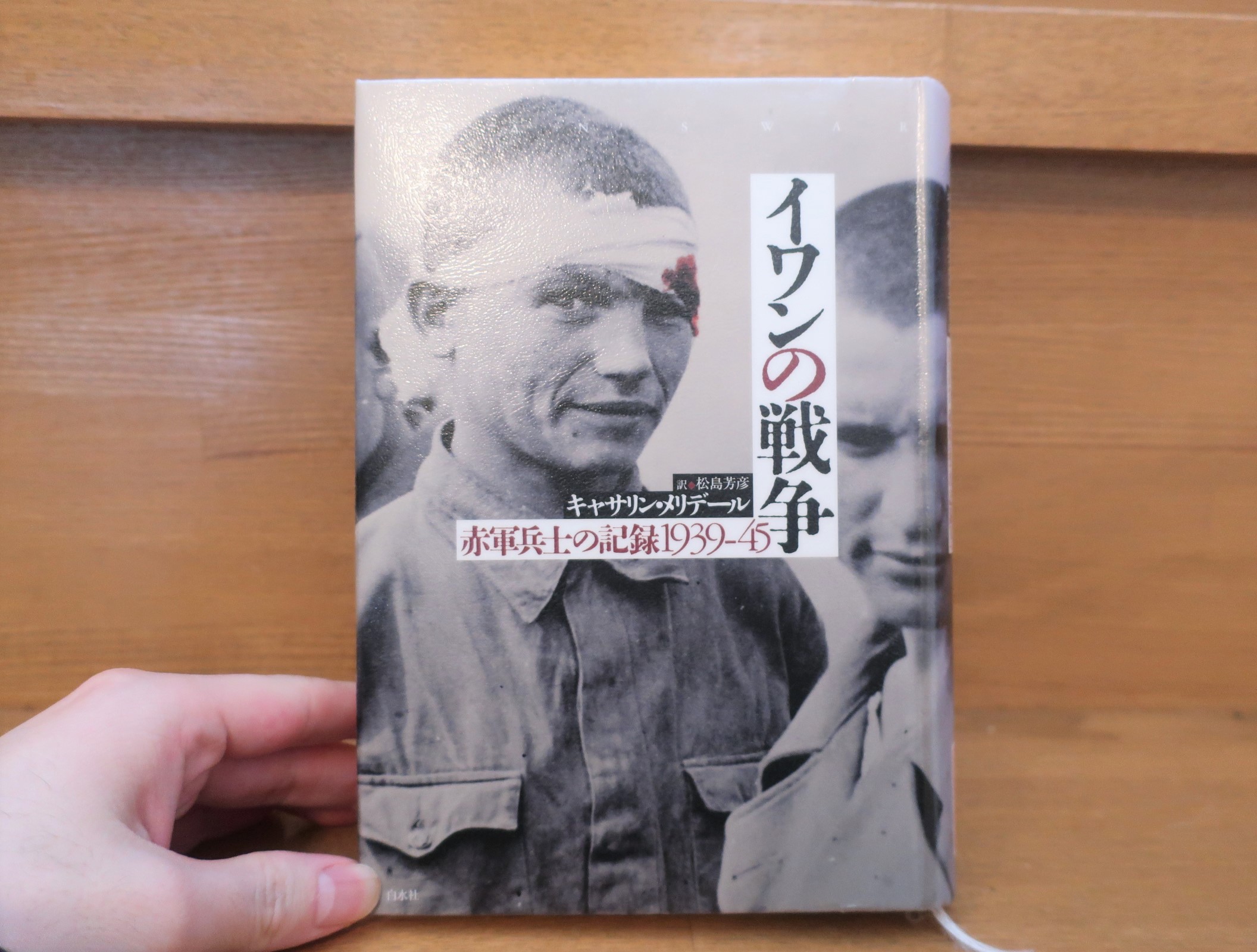
キャサリン・メリデール『イワンの戦争 赤軍兵士の記録1939-45』を読む⑶
今回も引き続き、キャサリン・メリデール著、松島芳彦訳『イワンの戦争 赤軍兵士の記録1939-45』を読んでいきます。
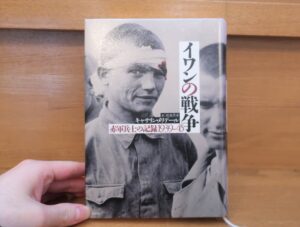
この本では一人一人の兵士がどんな状況に置かれ、なぜ戦い続けたかが明らかにされます。
彼ら一人一人は私たちと変わらぬ普通の人間です。
しかし彼らが育った環境、ソ連のプロパガンダ、ナチスの侵略、悲惨を極めた暴力の現場、やらねばやられる戦争という極限状況が彼らを動かしていました。
人は何にでもなりうる可能性がある。置かれた状況によっては人はいとも簡単に残虐な行為をすることができる。自分が善人だと思っていても、何をしでかすかわからない。それをこの本で考えさせられます。
では早速始めていきましょう。
独ソ戦の開始
まるで映画が現実になったようだった。赤軍は、最初の戦争から二十年を経ても、男らしさや英雄主義、自己犠牲というイメージの集積を超える戦争観を獲得していなかった。
近代戦に真に必要な、数字の裏付けがある戦術、自己抑制、洗練された武器と設備が、この世代には安っぽく思われた。
例えば、誇らしげな報告がある。第五大隊一四七歩兵部隊の副政治将校は「祖国とスターリンのために!」と叫びながら突撃するよう命じた。彼は真っ先にフィンランド軍の銃弾に倒れた一人だった。別の大隊では、共産主義青年同盟の兵士たちが、スターリンの誕生日である十一月二十二日を祝って、意味のない攻撃を数多く仕掛けた。
白水社、キャサリン・メリデール著、松島芳彦訳『イワンの戦争 赤軍兵士の記録1939-45』P93
※一部改行しました
ソ連は第一次世界大戦やその後のロシア革命による内戦を経て20年経っても、その時の価値観を引きずったままでした。
これはかつての日本もそうでした。日清・日露戦争の神懸かった勝利によって精神論で全てを片付けようとするところはかなり似ているところがあります。
「祖国とスターリンのために!」と無謀な突撃をしていく死に方も驚くほど似ていますよね。
人海戦術の突撃と「ウラー!」という叫び声
愛国神話が生まれた。戦いに際し精神を高揚させるため、赤軍全体が一つの言葉を叫んだというのだ。ドイツの退役軍人は、血も凍るような「ウラー!」をよく覚えている。
数百万の赤軍兵士が後に思い出す共通の雄たけびは「祖国のために!」と「スターリンのために!」だった。ただ近年になって、最後まで士官になれなかった元古参兵たちは、自分が何を叫んだか確信が持てないと言い出した。
「俺たちがそう叫んだって?」。農民の息子で元兵士のイワン・ゴーリンは笑った。「敵の銃火に向かう時に雄たけびを上げたのは確かだが、そんな上等な言葉じゃあなかった」。
士官や警官は、はるか後方にいて突撃の声は聞いていない。誰でも知っているスローガンを使ったのは、それなりの理由があったからだ。
ゴーリンやワシーリ・ブイコフのような元軍人の著述家が、後になって何を言おうが、戦いの前に悪態をつくのは縁起が悪いという迷信は生きていた。別の言葉を叫ぼうと事前に示し合わせれば、秘密警察の関心を引いただろう。
兵士が口にする言葉はいろいろだったが、長く尾を引く「ウラー!」は全員が使って、恐怖を誘った。
生き残りが言うように、誰にも馴染みのときの声だったのだろう。誰の名を叫ぶかはどうでもよかった。兵士たちには、戦いの雄たけび、一人ひとりの両肺を震わせ、筋肉を躍動させる大音声が必要だった。意味より音が大切なのだ。まず、ときの声そのものが神聖化した。言葉がまとうカリスマ性を、生身の人間がおもむろに認めるのは後になってからだった。
白水社、キャサリン・メリデール著、松島芳彦訳『イワンの戦争 赤軍兵士の記録1939-45』P155-156
※一部改行しました
「ウラー!」という言葉はソ連兵がよく口にした叫び声でした。
Goo辞書では「突撃のときに、または歓喜を表して発する語。万歳。」という意味として書かれていました。
Youtubeに何の映画かはわかりませんが、おそらく独ソ戦の戦闘と思われるシーンでまさしく「ウラー!」の叫び声と共に突撃する映像がありましたのでこちらに引用します。かなりショッキングな映像なのでご注意ください。
冒頭の突撃シーンから寒気がしました。これは迎え撃つドイツ兵もとてつもない恐怖だったと思います。
殺しても殺しても次から次へ死を恐れずに突撃してくる。これほどの恐怖はありません。
そして無謀な突撃は案の定壊滅的な被害を出しソ連兵は撤退するのですが、驚くべきことに、撤退する兵士を今度はソ連司令部が殺戮するのです。
ソ連軍において撤退は許されません。この後で紹介しますが、死ぬまで戦えという指令が鉄の掟として存在していたのです。だから撤退して戻ってきた兵士を軍規違反として殺すのです。
ソ連兵はナチス兵に蹂躙され、逃げれば今度はソ連軍にも殺されるのです。
こうして最前線に立たされる無数の兵士の死体が累々と積み重ねられていったのです。「ウラー!」の叫びと共に人海戦術が行われていたのでありました。
ただ、これは何もソ連だけの話ではありません。
敵前逃亡や軍規違反はどこの軍でも厳しく罰されます。
そして突撃攻撃もそれは同じです。特に日本も無謀な特攻を何度も繰り返しています。
大戦末期の特攻は私達もよく耳にしますが以前当ブログでも紹介した1939年のノモンハンの戦いでもそれは見られました。
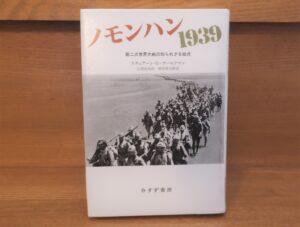
この記事でお話したことを改めて引用したいと思います。
1939年のノモンハン事件はこうして成立した軍国主義日本が引き起こした事件となります。
その戦闘は悲惨を極めます。あまりにも杜撰な作戦、相手を過小評価し、精神論で敵を倒そうとする戦法が完全なる敗北をもたらすことになります。
あまりの負けっぷりに私は読んでいて思わず目を反らしたくなりました。
慢心し相手の調査を怠り、情報のないまま相手を弱者と決めつけ、準備を怠る。そしていざ戦闘が始まれば物量、兵力が全く勝負にならないにも関わらず精神論で迎え撃とうとし玉砕する・・・あまりに悲惨。命令に従った兵士たちはただただ命を落とすしかありません・・・
その中でも私の中で最も印象に残ったのはソ連の戦車に生身のままで突っ込んでいく日本兵の描写でした。
もう一度言います。日本軍は生身で戦車に突撃していったのです。
第二次世界大戦前夜の戦闘でそんな光景があったということに驚きを禁じ得ません。
日本は圧倒的に兵力不足で武器もありません。だから火炎瓶をもって戦車に突撃したのです。まったく勝ち目のない戦いです。
ただ、驚くべきはそれでも日本軍は60台以上の戦車を破壊したそうです。
信じられますか?生身で突撃して戦車を60台以上も破壊したのです。
当時のソ連の戦車は装甲も薄く、エンジン部分が高温で、そこに火炎瓶を当てれれば行動不能にすることができたそうです。
さらに驚くべきは戦車によじ登ってハッチを開け直接乗組員を倒したこともあったそうです。
もう信じられません。精神論ですべてを解決しようとしていく作戦の果てがこうした突撃作戦です。
ですがこうした反撃も虚しく、ソ連の圧倒的な物量と的確な攻撃、物資補給によりあっという間に日本軍は壊滅させられます。はなから勝負は付いていたも同然でした。
『ノモンハン1939 第二次世界大戦の知られざる始点』独ソ戦に巨大な影響を与えた大事件より
ノモンハンでは圧倒的な戦力差によって日本軍は壊滅させられてしまいますが、独ソ戦においてはソ連が人海戦術によってナチスを苦しめたのでした。
ですがひとりひとり散っていった兵士の人生はどうなるのでしょうか・・・スターリンにとってはそういうことなど考えたこともなかったのかもしれません・・・
悪名高い命令第二二七号―「一歩も引くな!死ぬまで戦え!」
都市の陥落、焼き尽くされるか朽ち果てるしかない農村の噂は、毎日のようにモスクワに届いた。北方ではレニングラードが包囲されながらも持ちこたえていたが、国の指導者たちは、その運命は風前の灯だと知っていた。南方からの便りは絶望的だった。
七月下旬、スターリンの我慢も限界に達した。アレクサンドル・ワシレフスキー参謀総長の報告をさえぎると、スターリンは彼に新たな命令書の立案を命じた。
一枚の命令書が、その夏に起きた戦況の決定的な転換を象徴することになる。スターリンは人々が馴染んだ考え方を根こそぎ引っくり返そうとした。敗北によって、既に古いやり方は崩れかけていたが、数か月のうちに変革は加速した。
命令第二二七号が発令された時、赤軍は息も絶え絶えだった。だが、戦争そのものが、新しい精神を注ぎ込むるつぼとなった。(中略)
スターリンの訓令は新しいスローガンになった。「一歩も引くな!」が軍の合言葉となった。全員が最後の血の一滴まで戦えと言われた。「射撃位置から引いても許されるのは、どんな場合ですか?」と尋ねる兵士がいたのだろう。後に応答要領ができて「死ぬまで退却は許されない」と定められた。
「あわてふためく者や臆病者は、その場でせん滅されねばならない」とスターリンは宣言した。明確な指示なしに部下に退却を命じた士官は、逮捕して死刑と決まった。
あらゆる軍人が何らかの新しい制裁の対象となった。営倉は居心地が良すぎて、おきて破りにはもったいなかった。以後、落後者、臆病者、敗北主義者、その他の不届き者は、懲罰大隊に送られた。
そこでは「祖国に対する犯罪を自分の血で償う機会」が与えられる。懲罰大隊には、決死攻撃やドイツ軍前線のはるか後方まで進出する作戦など、最も過酷な任務が割り当てられた。最後の機会を与えられて、彼らは感謝すべきだとされた。
死(もしくは、規則上の表現を借りれば、生命を脅かす負傷)は、彼ら落後者にとって、名誉を回復し、家族を救い、ソビエト人民の前に自らの誇りを取り戻した証しだった。
他の兵士にも気合を入れることになった。新しい規則を導入し、通常の部隊から選抜した要員を前線部隊の背後に配置した。この「封殺部隊」は、従来から背後の監視を任務としてきたNKVDの部隊「ザグラドオトリャドゥイ」を補佐して、遅れをとる兵士や逃げる兵士を容赦なく射殺する任務を帯びた。
白水社、キャサリン・メリデール著、松島芳彦訳『イワンの戦争 赤軍兵士の記録1939-45』P178
※一部改行しました
これが先ほど映像で見た撤退者の銃殺シーンの原因となります。(※もしかしたら先ほどの映像は違う理由かもしれませんが、ソ連ではあのように撤退者を容赦なく殺していたとされています)
命令第二二七号が兵士に与えた影響
スターリンの新しい命令には、顔を一発張りとばして、兵士の目を覚まさせ、責任を問う狙いがあった。兵士も多くの場合、憑き物が落ちたような反応を示した。
「必要かつ重要な一歩だった」と、レフ・ルヴォヴィチは私に語った。「我々はその命令を聞いて、自分の立つ位置を確かめた。そして全員が、これは本当なのだが、気持ちが軽くなったものだ。そう、心が晴れたようだった」
白水社、キャサリン・メリデール著、松島芳彦訳『イワンの戦争 赤軍兵士の記録1939-45』P180
※一部改行しました
この命令によって兵士たちは憑き物が落ちたようになったとはどういうことなのでしょうか。
そして、「我々はその命令を聞いて、自分の立つ位置を確かめた。そして全員が、これは本当なのだが、気持ちが軽くなったものだ。そう、心が晴れたようだった」という言葉は何を意味しているのでしょうか。
実際に体験していない私には究極的なことはわかりません。
しかし、彼らはこの命令によってもはや退路を断たれたのです。もはや彼らにはただ前に進むしかありません。何を考えようがそれしかないのです。
そしてそれは上からの命令です。そこにはもはや自分の責任はありません。ただ従うしかない。やるしかないのです。
善悪の極限状態である戦場において、兵士は精神的な葛藤に追い込められます。葛藤とは、何かに対し「善いか悪いか」という精神的な苦闘です。ですがこの命令によって何が善で何が悪かも考えることすらできなくなりました。もう考える必要はないのです。すべては命令に従うのみとなった。何をすべきかという葛藤から解放されたのです。だからこそ憑き物が落ちたという表現になったのではないでしょうか。
「自分で何かを考えることの重み」の究極の場面をこの引用では思い知らされたように感じます。
生身の人間としての兵士たち
ソ連軍は兵士の肉体と精神を保つことには無頓着だった。しかし、ある生存者の言葉を借りれば、闇の中に影の気配を感知するほど神経が研ぎ澄まされた時、兵士もまた「紛れもない生身の人間」だった。
一人の士官が後になって妻に手紙を書いている。
「多くの英雄的行為を目撃したのは事実だ。でも、赤軍の恥辱も数多く目にした。残虐行為すれすれの無慈悲な仕業が自分にできるとは、考えてもみなかった。自分は善良な人間だと思ってきた。だけど、こんな時にならないと頭をもたげない性質を、人間は奥深くに長い間隠し持っているものなのだ」。
白水社、キャサリン・メリデール著、松島芳彦訳『イワンの戦争 赤軍兵士の記録1939-45』P201
※一部改行しました
自分は善人だと思っていた。まさか自分が考えるのも恐ろしい残虐な行為をするとは思っていなかった。しかしある状況に落とし込まれればやってしまうのだ。誰しもがそういうものを持ち合わせているのだ。
これは2019年に私がアウシュヴィッツを訪れた時にも感じたことでした。

親鸞聖人は『歎異抄』で「さるべき業縁のもよほさば、いかなるふるまいもするべし」と仰られています。人間は置かれた縁によって何にでもなりうる存在であると親鸞聖人は考えます。
いくら自分が善人であると思っていてもいつどうなるかわからない。そのことに気づかなければならぬと親鸞聖人は警告するのでありました。私はこの箇所を読み、ふとそのことを思い出したのでありました。
戦闘によって束縛から解放される
兵士は死より悪い結末があると学んだ。士官の告白にさらに耳を傾けよう。
「望むと望まないとにかかわらず、廃人になったらどうしようという考えに行き着いてしまう。妻はどうするだろう?自由にならない体なんて、考えるだけでゾッとする。もちろん、それは現実によくある話だ。でも、そうはならないと考えたいのだ。満ち足りて、健全な人生が送れるのだと」。
健全な人生と、おそらくは、死による救いの二つに一つだった。兵士は我を忘れられる行動を求めるようになった。(中略)
暴虐と死の真っ只中を生き残る罪の意識と喜びが、戦友同士の強い絆を織り成した。生が極限まで単純化されると、何かこだわりが消えたような気がして、戦闘でもしばしば、束縛から解き放たれる感覚が訪れた。
党はさっさと手柄を横取りした。兵の勇気が党の功績であるかのように、彼らを忠実な青年共産主義者、誠実な愛国主義者と呼んだ。党官僚がいくら美辞麗句を並べても、兵士を奮い立たせたのは、言葉を超えた感情だった。愛と言っても差し支えないものに裏打ちされた真っ直ぐな憤怒だった。
彼らはなぜ戦い続けることができたのか。そのヒントがここにあるように思えます。人間にはそういう本能があるのでしょうか。極限状態で戦うことで何かから解き放たれるような感覚が生まれる。これは重要な示唆だと思います。
そしてこの箇所の最後もまた重要です。
「党官僚がいくら美辞麗句を並べても、兵士を奮い立たせたのは、言葉を超えた感情だった。愛と言っても差し支えないものに裏打ちされた真っ直ぐな憤怒だった。」
「言葉を超えた感情」、「愛と言っても差し支えないものに裏打ちされた真っ直ぐな憤怒」が彼らを奮い立たせていたと著者は述べるのです。
特に「愛と言っても差し支えないものに裏打ちされた真っ直ぐな憤怒」というものが目を引きます。愛と憤怒は両立し、愛のために怒り、戦い、敵を殺すのです。
続く
Amazon商品ページはこちら↓
次の記事はこちら

前の記事はこちら

ソ連兵は何を信じ、なぜ戦い続けたのか「独ソ戦に学ぶ」記事一覧はこちら

関連記事

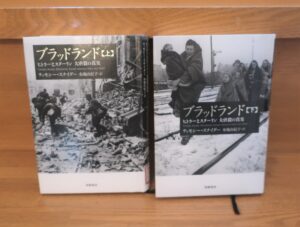

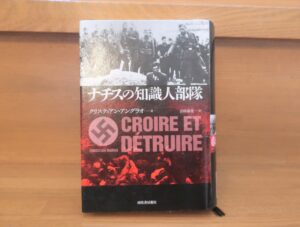
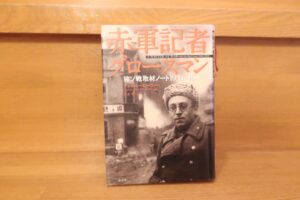
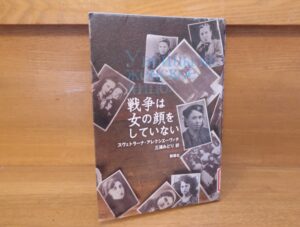
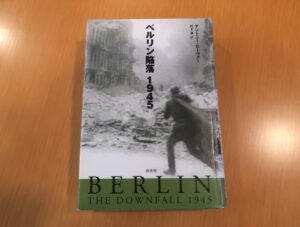

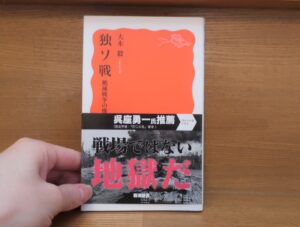

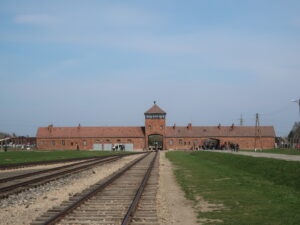
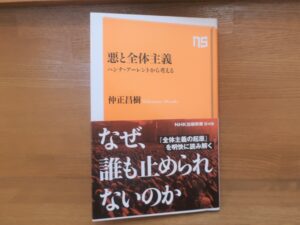
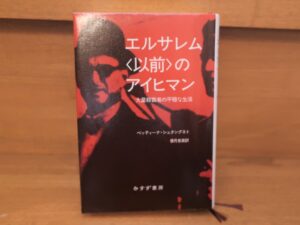
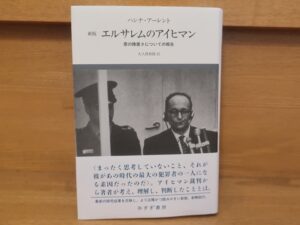
コメント